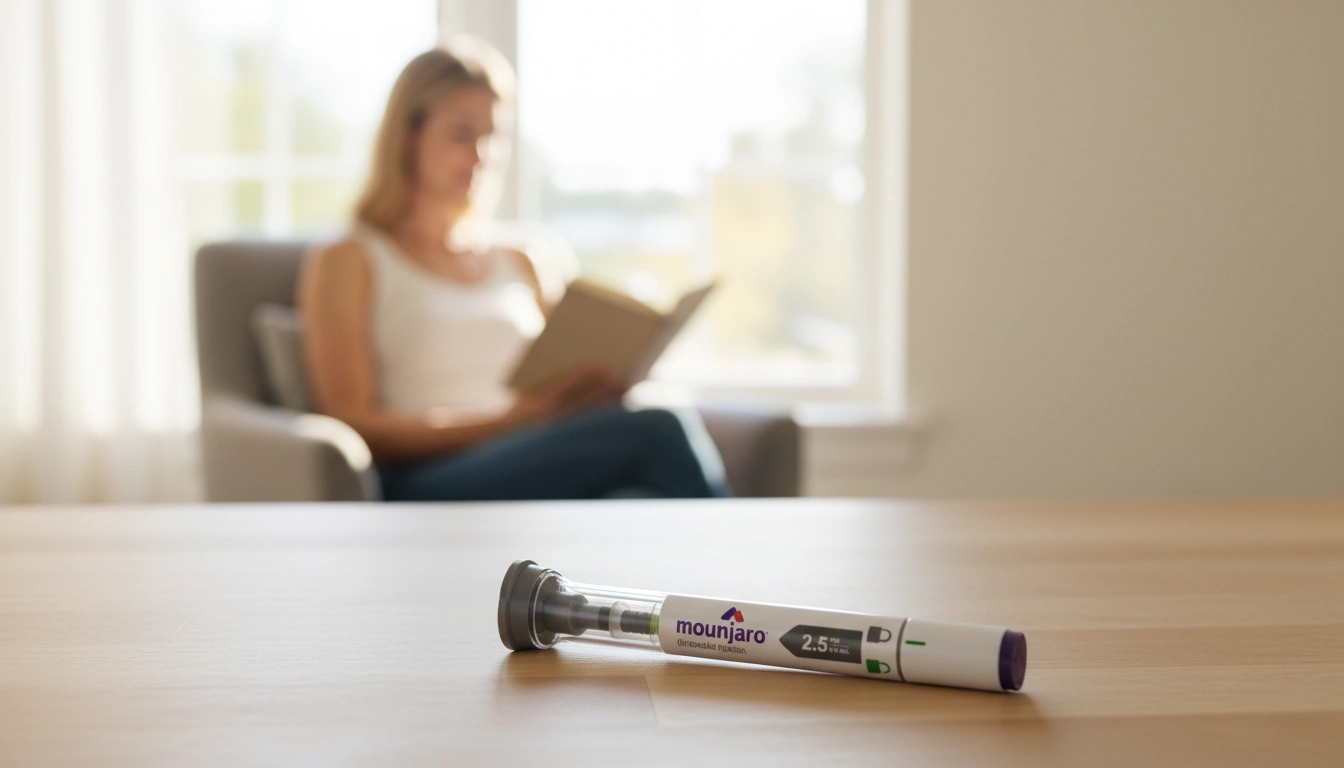Does Mounjaro Have Side Effects? Understanding the Impact of Tirzepatide

When it comes to managing weight and type 2 diabetes, Mounjaro (tirzepatide) has emerged as a promising option. However, curiosity about its side effects is common among potential users. Are you one of those considering this medication and wondering, "Does Mounjaro have side effects?" You're not alone. The excitement surrounding Mounjaro's effectiveness often comes paired with a need to understand what it might do to our bodies.
At TrimRx, we believe in empowering individuals with comprehensive knowledge about their health choices. This blog post will delve into the potential side effects of Mounjaro, shedding light on what you might experience during treatment. We will also highlight how our personalized weight loss solutions can support you in your wellness journey. Together, we'll explore the facts so you can make informed decisions regarding your health.
Introduction
Did you know that nearly 37 million Americans are currently living with diabetes, and many more are struggling with obesity? With obesity being a significant risk factor for developing type 2 diabetes, the search for effective treatments has become increasingly relevant. Mounjaro, a relatively new injectable medication, has garnered attention for its dual role in managing blood sugar levels and facilitating weight loss.
As we navigate this discussion, we aim to provide insights into the side effects associated with Mounjaro, allowing you to weigh the benefits against potential risks. Understanding these side effects is crucial, especially since experiences can vary widely among individuals. Our goal is to equip you with the information you need to engage with your healthcare provider confidently.
In this blog post, we will cover:
- What Mounjaro is and how it works
- Common and serious side effects
- Factors influencing side effects
- How to manage these side effects
- The importance of personalized care and support from TrimRx
By the end of this post, you will have a clearer picture of what to expect from Mounjaro and how it fits into your weight loss or diabetes management plan.
What is Mounjaro?
Mounjaro (tirzepatide) is a once-weekly injectable medication designed for adults with type 2 diabetes. It works by mimicking the action of two hormones—glucagon-like peptide-1 (GLP-1) and glucose-dependent insulinotropic polypeptide (GIP)—that play vital roles in regulating blood sugar levels and appetite. This unique mechanism allows Mounjaro to lower blood glucose while promoting feelings of fullness, which can lead to weight loss.
The FDA has approved Mounjaro not only for diabetes management but also for weight loss in individuals with obesity and weight-related health conditions. This makes it an attractive option for those seeking to improve their overall health through weight management.
Common Side Effects of Mounjaro
Like many medications, Mounjaro may cause side effects. While not everyone will experience these, being aware of potential reactions can help you prepare. Commonly reported side effects include:
- Gastrointestinal Distress:
- Nausea: This is one of the most frequently reported side effects, affecting up to 22% of users, particularly during the initial weeks or with dosage increases.
- Diarrhea: Affects approximately 12% to 17% of participants, often subsiding as the body adjusts.
- Vomiting: Some users may experience vomiting, which is usually transient.
- Appetite Changes:
- Users often report a decreased appetite, which can be beneficial for weight loss but may also lead to unintentional weight loss or nutritional deficiencies if not managed properly.
- Injection Site Reactions:
- Mild redness, swelling, or irritation at the injection site can occur in about 3% of users. These reactions typically resolve on their own.
- Dizziness:
- Some users report feelings of dizziness or lightheadedness, which can be indicative of low blood sugar, especially in combination with other diabetes medications.
Most of these side effects are temporary and may diminish over time as your body adjusts to the medication. However, if they persist or worsen, it is important to consult with a healthcare professional.
Summary of Common Side Effects
- Nausea: Up to 22% of users.
- Diarrhea: Affects 12-17% of users.
- Injection Site Reactions: Mild, affecting about 3% of users.
- Dizziness: Can occur, especially with other diabetes medications.
Serious Side Effects of Mounjaro
While most side effects are mild, some serious reactions are possible. These may require immediate medical attention and include:
- Pancreatitis:
- Inflammation of the pancreas, which can cause severe abdominal pain radiating to the back, nausea, and vomiting. It is crucial to recognize symptoms early and seek medical help.
- Thyroid Tumors:
- Mounjaro carries a boxed warning regarding the risk of thyroid cancer, including medullary thyroid carcinoma, observed in animal studies. Users should report any swelling in the neck, hoarseness, or difficulty swallowing.
- Kidney Problems:
- Dehydration caused by gastrointestinal side effects can lead to acute kidney injury. Symptoms include decreased urination, weakness, and confusion.
- Severe Allergic Reactions:
- While rare, symptoms such as difficulty breathing, swelling of the face or throat, and severe rashes can occur, necessitating urgent medical care.
- Gastroparesis:
- A rare condition where the stomach cannot empty properly, leading to severe nausea and vomiting. Users should be vigilant for signs of stomach paralysis and seek help if symptoms arise.
Summary of Serious Side Effects
- Pancreatitis: Severe abdominal pain, nausea, vomiting.
- Thyroid Tumors: Risk of thyroid cancer, report swelling or hoarseness.
- Kidney Problems: Dehydration can lead to acute kidney injury.
- Severe Allergic Reactions: Difficulty breathing, swelling, or rash.
Factors Influencing Side Effects
Several factors can influence the likelihood and severity of side effects when taking Mounjaro:
- Dosage:
- Higher doses are often associated with increased side effects. As with many medications, starting at a lower dose and gradually increasing may help mitigate adverse reactions.
- Individual Health Conditions:
- Pre-existing conditions, particularly gastrointestinal disorders or kidney issues, may predispose individuals to more significant side effects.
- Concurrent Medications:
- Taking Mounjaro alongside other diabetes medications, especially insulin or sulfonylureas, can raise the risk of hypoglycemia and other side effects.
- Dietary Habits:
- What you eat can impact how you experience side effects. Avoiding high-fat or spicy foods, eating smaller meals, and staying hydrated can help manage gastrointestinal discomfort.
Managing Mounjaro Side Effects
Understanding how to manage side effects can empower you to continue using Mounjaro effectively. Here are some strategies to consider:
- Dietary Adjustments:
- Focus on bland, low-fat foods to help reduce nausea. Eating smaller, more frequent meals can also help stabilize digestion.
- Hydration:
- Drink plenty of fluids, especially if experiencing diarrhea or vomiting, to avoid dehydration and support kidney health.
- Regular Monitoring:
- Keep track of your blood sugar levels and any side effects you experience. This information can be invaluable when discussing your treatment plan with your healthcare provider.
- Consulting Your Doctor:
- If side effects become bothersome or persistent, always communicate with your healthcare provider. They can adjust your dosage, suggest alternative medications, or provide additional support.
- Support from TrimRx:
- At TrimRx, we offer personalized support through our weight loss programs. Our approach combines medically supervised care with ongoing support, ensuring that you have the resources needed for a successful wellness journey. Consider taking our free assessment quiz to see if you qualify for our prescription weight loss medications, including Mounjaro.
Conclusion
Mounjaro presents a promising option for individuals managing type 2 diabetes and seeking weight loss support. While it can offer significant benefits, being aware of the potential side effects is essential for making informed decisions about your health. Most side effects are mild and manageable, but serious reactions can occur, making it crucial to consult your healthcare provider regularly.
By understanding what Mounjaro can do for you and how to manage its side effects, you can embark on a successful journey toward improved health. TrimRx is here to support you through personalized, medically supervised weight loss solutions that prioritize your unique needs. We invite you to take our free assessment quiz to explore if Mounjaro or other weight loss options may be right for you.
FAQ
Q1: Can Mounjaro cause low blood sugar?
A1: Low blood sugar is not a common side effect of Mounjaro itself. However, if used with other diabetes medications, especially insulin, the risk increases. Regular monitoring and consultation with your doctor are recommended.
Q2: How long do side effects last?
A2: Many side effects are temporary, especially gastrointestinal issues, which may resolve within a few days to weeks. If side effects persist or worsen, consult your healthcare provider.
Q3: Is Mounjaro safe for everyone?
A3: Mounjaro may not be suitable for individuals with a history of certain medical conditions, such as medullary thyroid carcinoma or pancreatitis. Always discuss your health history with your doctor before starting treatment.
Q4: What should I do if I experience serious side effects?
A4: If you experience severe symptoms, such as abdominal pain, difficulty breathing, or signs of an allergic reaction, seek immediate medical attention. For non-serious side effects, consult your healthcare provider for management strategies.
By staying informed and proactive about your health, you can navigate your weight loss or diabetes management journey with confidence.

Transforming Lives, One Step at a Time
Keep reading
Navigating Nutrition: What to Eat with Mounjaro for Optimal Results
Maximize your Mounjaro results! Discover what to eat with Mounjaro to enhance weight loss, manage side effects, and build healthy habits. Get expert diet tips now!
Optimizing Your Journey: What to Eat During Mounjaro Treatment
Maximize Mounjaro’s benefits with our guide on what to eat during Mounjaro treatment. Discover foods that boost weight loss, manage side effects, and optimize your health. Start your journey today!
Can I Eat Mango on Mounjaro? A Deep Dive into Diet and Weight Management
Can I eat mango on Mounjaro? Get expert insights on fruit choices, what to eat, and what to avoid to maximize your weight loss with Mounjaro. Discover your personalized plan!



